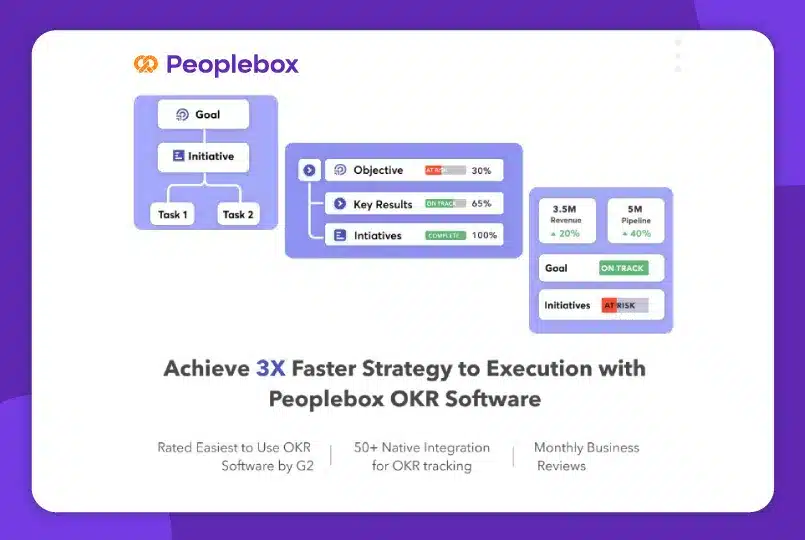No matter how brilliant your mind or strategy, if you’re playing a solo game, you’ll always lose out to a team.
Says Reid Hoffman, co-founder of LinkedIn, and we cannot agree more with him!
A manager is incomplete without his team. She can not be successful playing a solo game.
Her success relies on how successfully she can guide her team to perform well.
Ben Horowitz, technology entrepreneur and co-founder Andreessen Horowitz, recalls an incident where he decided to read all exit interviews during a time of particularly high attrition at Netscape to understand why people quit hi-tech companies.
One of the two primary reasons he found out why people quit was:
‘They hated their manager – generally the employees were appalled by the lack of guidance, career development and feedback they were receiving.’
Now, one thing is clear.
It is not just the results, but the route to achieving results a manager takes, which makes him a bad, an average or a great manager.
If you are reading this blog, we are sure you want your name to be in the list of great managers and nowhere else.

What is a ‘Great’ Manager After all?
Jeff Weiner, Steve Jobs, Elon Musk, Jeff Besos, Warren Buffet… What do they all have in common? They are all successful leaders, known globally for founding and running multi-billion-dollar companies.
One more thing that is common between these great leaders is that to succeed, they rely on great managers who keep the teams together and constantly engaged to ensure overall success of the organization.
A great manager is both a people’s & result-oriented person – she truly cares for her team and at the same time is always in the quest for progressing to achieve the best results.
Tech giant Google’s Project Oxygen has proven extremely insightful for managers and leaders as well.
After years of research and analysing data, Project Oxygen listed down 8 characteristics of a good manager:
- Be a good coach
- Empower the team and do not micromanage
- Express interest in employees’ success and personal well-being
- Be productive and results-oriented
- Be a good communicator — listen to your team
- Help the employees with career development
- Have a clear vision and strategy for the team
- Have key technical skills that help him or her advise the team
Let’s see what other experts have to say.
Kim Scott, author of best-seller ‘Radical Candor: How To Be A Kick-ass Boss Without Losing Your Humanity’ says:
Radical Candor is the secret to being a good boss.
According to Scott, if you ‘Care Personally’ and ‘Challenge Directly’ you achieve Radical Candor. When you care personally for your employees (get to know them personally, beyond work, without crossing the line), it helps you build an honest & transparent relationship with them and making it easy for them to absorb your feedback when you ‘challenge directly’. (More on this later)
In the book ‘The One Minute Manager’ authors Kenneth Blanchard & Spenser Johnson talk about a young man in search of an effective manager who happens to meet an older man who calls himself ‘One Minute Manager’.
During a conversation between them, the ‘One Minute Manager’ says,
How on earth can I get results if it’s not through people? I care about people and results. They go hand in hand.
All experts in the above instances have tried to answer the question, ‘what makes a great manager’.
How can you Become a Great Manager?
Taking inspiration from these and many other experts, coupled with our learning and interactions while working with a number of managers and HR professionals, we have come up with a comprehensive list of 10 questions a manager must ask himself, regularly, in order to become a great manager.
Let’s get started.
Do you Care for Your Team?

In her book ‘Radical Candor’, Kim Scott says,
Caring Personally means demonstrating that you “give a damn” about the people you work with.
To get an affirmative answer to the question, ‘do you care personally’ you must ascertain the following two things:
- Are you able to put your employees’ needs ahead of yours?
- Do you listen to your employees’ problems with the intent of providing viable solutions to them?
Former Chief Executive of Google, Eric Schmidt says,
Managers serve the team
and rightly so.
A few tips to ensure you are doing a great job when caring for your employees:
- Show interest in their lives beyond work, but without crossing the line.
- Make time for them. Be there to guide them and interact with them regularly, without being too meddlesome.
- Understand your employees’ ambitions deeply and try your best to create learning opportunities for them.
- Set the right expectations for them. Don’t promise or commit more than you can offer.
- Take your 1-on-1 meetings with your direct reports seriously.
- Ask them questions, such as,
‘Are you happy here’,
‘How can I help you achieve your goals’
‘How can I help you overcome your challenges’
‘Any suggestions about how we can improve current work processes’ - Interactions like these go a long way. They make the employee feel more than just a team member making them feel valued and motivated. As written in ‘The One Minute Manager’:
‘People Who Feel Good About Themselves Produce Good Results’
Does Your Team Trust you or Fear you?

Great managers manage by trust, not fear.
By ‘trust’ we mean, your team must be able to trust your decisions, they should be able to believe that your words will be followed by necessary actions, that you mean what you say, and they can confide in you if they are facing a challenge, professionally and if required, personally as well.
Building trust in your team leads to innovation, better collaboration, encourages creative thinking, and increases productivity.
On the contrary, ‘fear’ implies you use your position and authority to control the team.
The outcome of this approach is detrimental to your team’s growth and may even lead you to lose your employees!
Fear doesn’t get the best of your team as they would always be afraid of failure and hence will never innovate and progress.
In this scenario, your team is afraid of being honest with you when it matters the most and they shy away from sharing the real challenges which can hamper the results.
John Hall, co-founder and president of Calendar, writes in article in Forbes:
Perception is a very real issue for leaders. They must decide how they want employees to view them and act accordingly.
A survey conducted by The Predictive Index in 2018 found that 51% of employees feel a manager who betrays trust is a bad manager.
You don’t want to be that manager, for sure.
Here’s how you can build trust in your team and be a great manager:
- Communicate effectively (more on this ahead) with your employees – be honest, transparent, clear and listen to them.
- Give them a fair chance to put across their ideas and share feedback.
- Be confident about your team and infuse confidence in them by providing autonomy for the delegated task.
- Be a manager of your words. Follow your words with actions.
- Encourage them to learn from their mistakes and give them constructive feedback.

Are you Communicating Right & Effectively?

The role communication plays in building a highly engaged team cannot be underestimated.
Effective communication (explained ahead) is critical in building a strong manager-employee relationship. And trust is an important outcome of effective communication.
If you are on the journey to greatness, know that winning your employees’ trust goes a long way.
‘Trust’ implies that your employees believe in what you communicate to them, be it feedback, advice (personal or professional), or a decision taken by you or top leadership.
And your employees will trust you only if you are transparent and clear with them, and do not hide relevant information involving or impacting them.
There is no joy in withholding consequential information from your employees, if they will eventually discover it.
For instance, you should update your employees about important decisions like team changes, leadership changes, role changes, project closures or extensions, etc. which will impact them.
A few points to keep in mind for effective communication:
- Clarity
- Be clear in your communication. Don’t mince your words. Direct communication is the best form of communication.
- Timely
- Do not wait for the right time to communicate with your employees. If it is a crucial decision involving them, you must convey it immediately, preferably in person.
- Honesty
- You must convey only the truth, and nothing else. Telling wrong things to the employees will only lead them to distrust you and may also hamper their productivity.
- Listen to them
- Listening is a very important part of communicating. Once you have shared your part of information, wait for them to share their views or ask questions, and resolve any doubt they may have.
Managers who are self-aware make better decisions, communicate more effectively, and are more relatable.
Are you Manoeuvring you Managerial Style for Each Team Member?

No two employees in your team are the same. Each comes with a unique potential, but have you tapped that potential yet?
Marcus Buckingham, motivational speaker and co-author of ‘Nine Lies About Work: A Freethinking Leader’s Guide to the Real World’ in a Harvard Business Review article says,
…there is one quality that sets truly great managers apart from the rest: They discover what is unique about each person and then capitalize on it.
As much as it is important for you to understand your employees’ motivations and what drives them, it is equally important to understand what puts them off and demotivates them.
Imagine a scenario where you are a manager at an ad agency. One of your employees is very vocal about her concerns and updates you about the challenges on her own, whereas another employee in your team is an introvert and feels talking about challenges can make him look silly.
What would you do?
A great manager would adapt to the behavior of the two. While he would wait for one to come up to him and share the progress and challenges, he would go to the other himself asking about the progress and challenges.
Unlock your team’s true potential and adapt to their style and strengths to help them bring out their best.
After all, that is one of your burning desires, isn’t it?
Is Your Feedback Helping Your Team?

Kim Scott places ‘Challenge Directly’ at par with ‘Care Personally’ in order to be ‘radically candid’ with your employees.
Tell people when their work is or isn’t good enough. BECAUSE you care.
There’s a thin line between your feedback being genuine & heartfelt and fake & harsh.
For instance, the two sentences:
Your work is not good enough or You are not good enough
both are forms of feedback, but the former will have a positive impact on the employee, motivating him to perform better.
In their book ‘Trillion Dollar Coach: The Leadership Playbook of Silicon Valley’s Bill Campbell’ authors Alan Eagle, Eric Schmidt, and Jonathan Rosenberg talk about the delicate art of giving feedback and how Bill Campbell mastered it. An excerpt:
Dave Kinser, Bill’s head of operations at Claris, recalls a time that Bill was going to chew out one of Dave’s fellow executives. Before the “ball busting,” Bill approached Dave, told him about what he was going to do, and asked him if he could talk to the exec afterward. Bill thought the guy would need some moral support. So later that day, Dave tentatively walked into the guy’s office and was surprised to see him excited and pumped up. Bill had indeed delivered the tough message, but the guy felt great about it. Dave went back to Bill’s office and took credit for rebuilding the man’s confidence, when in fact no damage had been done!
A great manager does not shy away from giving negative feedback because she truly cares for her team.
And the best way to give negative feedback is through constructive criticism.
By constructive criticism we mean, you share the feedback in an objective manner, pointing out the implications of the work done and moving forward to a plan to help the employee improve.
Taking reference from ‘Radical Candor’ again here: An ‘obnoxiously aggressive’ manager, someone who is ‘brutally honest” or ‘front-stabbing’ is way better than a ‘ruinous empathetic’, someone who avoids negative feedback because he doesn’t want to make her feel bad.
Here are a few tips to help you give constructive criticism:
- Criticize in private and keep the praise for public.
- Don’t be arrogant when giving feedback. Back your feedback with a rational explanation, if required.
- Be spontaneous with your feedback. Don’t park it for later. The sooner the better.
- Don’t forget to follow-up on the progress. Telling an employee what went wrong is not enough. You need to continually check with them if they are able to get it right and help them overcome the challenges.
Do you Micromanage or Provide Autonomy?

Steve Jobs was once quoted saying,
It doesn’t make sense to hire smart people and tell them what to do; we hire smart people so they can tell us what to do.
Google’s Project Oxygen resonated the same belief stating ‘Empower the team & don’t micromanage’ as one of the 8 characteristics of a good manager.
But how do you know you are micromanaging? Most managers do it even without realising, and that can be even more harmful for the team. Below is a quick checklist to find out if you are micromanaging or not.
You are micromanaging your team if / when:
- You have difficulty delegating work, and end up doing most work by yourself.
- You always feel frustrated with the results, because you feel you could have done a better job yourself.
- You want yourself to be cc’d on all mails your employees share.
- You constantly ask for updates from your team about where they stand on the work assigned.
We understand, that as a manager you may be tempted to do a certain task yourself (many times), instead of taking time to explain or letting your employees take their chances, but you must always remember that,
A micro-manager can not be a great manager. To be a great manager you must provide autonomy to the team.
So how do you stop yourself from micromanaging? Here are a few suggestions:
- Once you have delegated work to the employee, observe their progress, but don’t intervene unless really required.
- Do not correct your employees’ mistakes all by yourself. Making mistakes constitutes a great part of learning. Don’t take it away from them.
- Provide autonomy to the employee. Once delegated, let them do their best. They would either sink or swim. In either case, be there to guide them through.
- When you see the employee is facing a challenge, get to the ‘what’ of the problem, rather than ‘how’. This means instead of dictating how to achieve the expected result, share what is the expectation instead. You may be surprised to see a new working style reaping better results than you expected!
- Have faith. Most managers micromanage driven by their fear to fail. Don’t let that fear trickle down to your team, it can damage their confidence making them feel helpless. Set your team for success, being clear what you mean by success, and have faith in the team.
Are you Spreading Positivity?

A successful manager always lets the optimist in her win.
A manager’s aura is contagious, and it must only pump optimism in the team.
You may never realise, but your team draws the motivation and zest to accomplish goals and be productive from the energy you bring to the office.
An article published by Harvard Business Review rightly points out:
People are more creative and productive when their inner work lives are positive — when they feel happy, are intrinsically motivated by the work itself, and have positive perceptions of their colleagues and the organization.
Here’s how you can maintain a positive attitude at work for a highly engaged and productive team:
- Be a positive leader.
- Create a culture of rewards and recognition.
- Motivate the employees when they perform good, but be objective in your praise.
- Smile more often. It costs nothing and only spreads good vibes.

Are you Holding Regular ONE-ON-ONEs With Your Team?

A Predictive Index survey conducted last year found out that one-on-one meetings have a great impact on how the team sees their manager. Employees rated those managers higher who met them daily or weekly.
One-on-one meetings are your opportunity to strengthen your relationship with your employee. Don’t confuse it with a status update meeting where you discuss only work. A 1:1 goes beyond that!
Ben Horowitz talking about why one-on-ones are important, says:
If you are an employee, how do you get feedback from your manager on an exciting, but only 20% formed idea that you’re not sure is relevant without sounding like a fool? How do you point out that a colleague that you do not know how to work with is blocking your progress without throwing her under the bus? How do you get help when you love your job, but your personal life is melting down? Through a status report? On email? Yammer? Asana? Really? For these and other important areas of discussions, one-on-ones can be essential.
The purpose of a 1-on-1 is to check in with your direct reports’ regularly and understand if they are happy with & at work, if they are facing any challenges, how you can help them overcome their challenges and fears, and build a bond that will take you a long way.
The most important outcome of a 1-on-1 is that you can nip a problem right in the bud!
Through a 1:1 meeting you can ‘care personally’ and ‘challenge directly’.
Emphasizing on the importance of one-on-one, Andy Grove, former CEO of Intel says,
Ninety minutes of your time can enhance the quality of your subordinate’s work for two weeks, or for some eighty-plus hours.
Some quick tips to make the most of your one-on-one meetings:
- Never cancel 1-on-1 meetings
- Set an agenda with your direct reports before the 1-on-1
- Take notes and keep them in one place so that you can track the progress in the next 1-on-1 meeting
- Make sure you follow-up on the action items discussed.
Do you Recognize Often?

A great manager recognizes her employees often. She never misses an opportunity to spot the hits by her employee and applauds & encourages them for their achievements.
Recognized employees are happy employees.
Whether or not we take work home, we do take our feelings from work back home.
A happy day at work translates into a happy time at home as well.
Regular recognitions to your team also make them recognize your efforts, in turn.
It boosts their confidence, self-esteem and helps you retain your employees.
But, the praise you shower over them must be objective, and not to just sway them away or to make them feel good.
Praising without an accomplishment can sound ingenuine and instil fake confidence into the team, and keep them away from tasting real success.
The author articulates this perfectly in ‘The One Minute Manager’:
Help People reach their Full Potential. Catch them Doing Something Right When he notices you have done something right he tells you precisely what you did right, and how good he feels about it.
Are you Driving Actions?

To be a great manager, you must remember that all your efforts lose meaning if you don’t take required actions.
Progress can only be tracked by the actions taken to achieve desired results.
Having worked with a number of managers now, we believe inaction after a discussion with the employees, or no explanation to the employee for an action promised, can create an atmosphere of distrust and also lower your respect in their eyes.
Here’s how you can avoid this scenario:
- Conduct regular one-on-one meetings with your employees, and update them about the progress on the issue they might have raised with you in a previous meeting.
- Use an effective one-on-one tool to keep an account of the follow-up items and update regularly.
- After you have understood and taken note of a problem an employee is facing, make sure to let him/her know about the status of the same.
- Create an action list with your actions due for your team. These to-do/action lists are your way to solve issues/hurdles/roadblocks your team is facing.
- Always prioritise team issues/ blockers over other things.
- Create opportunities for yourself to find issues to be resolved. Never skip one-on-ones, seek regular feedback, create happy hours / all-hand meetings and ensure you take note of actions items.

Conclusion:
We understand being a manager can be demanding! And knowing that the organization’s success relies on your success in turn, can put your skills to test, not just once, but many times in a single day.
Talking of Steve Jobs’ second stint at Apple as a CEO, Bill Campbell in Trillion Dollar Coach recalls:
He had always been charismatic, passionate, and brilliant. But when he returned, I watched him become a great manager. He was detailed in everything. Product of course, but also in the way he ran the finance organization, the sales organization, what he did with operations and logistics. I learned from that. Steve couldn’t be a good leader until he became a good manager.
That in itself creates an opportunity for you to become a better manager than you were yesterday, by achieving better results with a highly efficient and productive team you have built & nurtured with care or are on the path to build one, and be the great manager you want to be!








